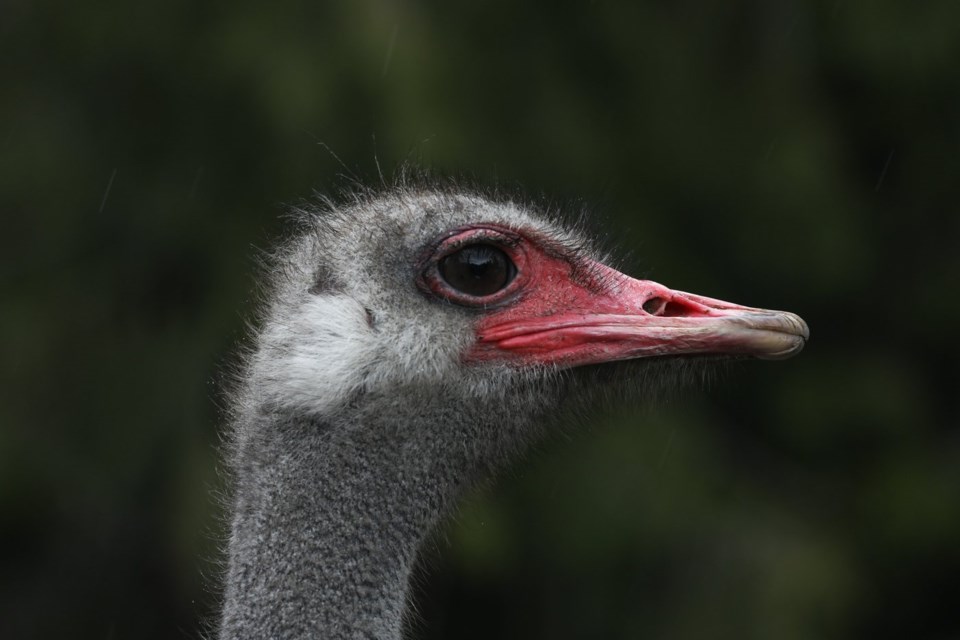Alberta Premier Danielle Smith says authorities should be looking for a “better way” than a mass cull to deal with a British Columbia ostrich farm that suffered an outbreak of avian flu.
Smith said there should be a new approach because most of the flock at Universal Ostrich Farms survived the outbreak, and there could be something to learn about "whether there's an immunity or some kind of vaccine" that could be developed.
Smith made her comments in Huntsville, Ont., where she and other premiers are meeting.
The Canadian Food Inspection Agency has ordered the destruction of about 400 birds at the farm in Edgewood, B.C., where 69 ostriches died in December and January.
The farm’s owners say the birds should be spared, in part because of their scientific value, and have taken the argument to the Federal Court of Appeal which reserved its judgment last week.
U.S. Health Secretary Robert F. Kennedy Jr. wrote to the CFIA offering to jointly study the birds, while former TV personality Dr. Mehmet Oz, now the administrator of the U.S. Centers for Medicare and Medicaid Services, said he would house them at his ranch in Florida.
Smith said she's "open-minded" about the United States partnering with B.C. to study the flock.
"I gather that the U.S. government is interested in partnering with B.C.," Smith said Tuesday.
"If they wanted to do that, I'd be supportive of that because you can see that this case has really taken on a lot of public sentiment behind it, and if we can find a better way than doing mass culls in any situation like this, I think it's probably worth it to try to find a better way to do it."
When asked about the ostrich situation, B.C. Premier David Eby said he has not brought up the issue of possibly saving the animals with Prime Minister Mark Carney.
The premier said the residents of B.C. don't take advice about avian flu and the ostriches from Robert F. Kennedy Jr. and Doctor Oz.
"They're beautiful birds, and bird flu is a massive and profoundly concerning issue for farmers in British Columbia and I know across Canada."
A BC Poultry Association spokesman Shawn Hall said that while he cannot comment directly on the ostrich situation, culling is necessary for commercial flocks of chicken and turkey.
"What I can say is that, unfortunately, depopulation is an important measure when you have an outbreak on a commercial poultry farm … because the mortality rate is pretty much 100 per cent," Hall said. "It's the humane thing to do to depopulate that flock in as humane a way as we can.
"So, our focus is really on minimizing the risk of infection with good biosecurity measures, and farmers in B.C. take those pretty seriously."
Hall said that B.C. poultry farmers are finding that the virus is not showing up at the gates but rather near ventilation ducts, indicating that the spread is not from farm to farm but possibly from wild birds near their barns.
He said the farmers do worry about any bird population that may carry the avian flu virus such as the ostriches because of possible spread through migrating wildlife, and the industry is focusing on what it controls such as improved ventilation filtration.
"Taking a look at everything that we can do to minimize the risk of infection of a flock is a real priority for us."
Smith said she asked her own agriculture minister about the case and if Alberta would have handled it differently if the outbreak occurred there.
The CFIA has said two of the birds that died tested positive for a "novel reassortment" of avian flu, which had not be seen elsewhere in Canada.
The agency has said its "stamping out" policy is a critical part of maintaining not only animal and human health, but also Canada's status as a reliable international trading partner.
The farm has attracted a vocal group of supporters, including some who have been camping at the property to thwart any attempted cull.
— With files from Brieanna Charlebois in Vancouver
This report by The Canadian Press was first published July 22, 2025.
Chuck Chiang, The Canadian Press



